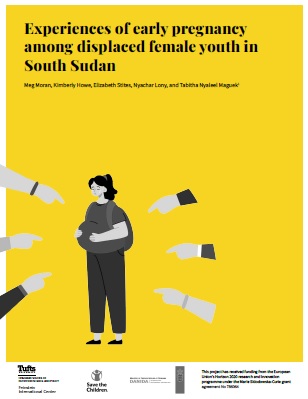In South Sudan, one in three girls become pregnant before turning 15 (UNCIEF 2020). The Ministry of Gender, Child, and Social Welfare reports that the risks of sexual abuse, child marriage, and early pregnancy have increased during the last few years given school closures and increased stress related to COVID-19 (UNICEF 2020). This briefing paper follows the lives of displaced female youth in South Sudan that had unintended pregnancies under the age of 18. The paper describes the circumstances leading to early pregnancy including a profound lack of access to information about sexual and reproductive health. It also focuses on the lives of female youth after becoming aware of their pregnancies and the impact of early pregnancy on marriage, education, mental health, family relationships, and household economics. The paper highlights the special situation of early pregnancy and female youth living with disabilities.
Main findings include:
- Most early pregnancies are unintentional
- Early pregnancy significantly negatively affects the economic situation of the natal family
- Early pregnancy makes one’s marriage prospects precarious. Marriages after early pregnancies, whether to the father of the baby or another man, are characterized by force, violence, divorce/separation, and loss of custody of children
- Going back to school after childbirth is possible, and common, despite dropping out of school during pregnancy
- Parents had mixed attitudes towards education for their daughters, seeing it both as a protective factor and driver for early pregnancy and early marriage.
One in five girls is married under the age of 18 globally, and this practice likely increases during crises, including conflict, displacement, and COVID 19. While the negative repercussions on the child bride, her family, and eventual children are well-documented, little is known about the needs, challenges, opportunities, and constraints faced by female youth in displacement, including how early marriage transpires, and how lives unfold after marriage. As such, the Feinstein International Center together with Save the Children Denmark followed a cohort of displaced adolescent girls in South Sudan and the Kurdistan Region of Iraq (KRI) between the ages of 14 and 23 for 1.5 years using holistic, participatory methods.
The sample included internally displaced South Sudanese in South Sudan, and Syrian refugees and displaced Yazidis in the KRI. Research participants were unmarried, married (as minors), divorced, and widowed. Many girls in the cohort became pregnant as minors, and/or have physical, psychological, and intellectual disabilities.
The researchers conducted more than 600 interviews with more than 100 members of the cohort. This data will inform briefing papers on six topics:
- early pregnancy and sexual and reproductive health
- decision making around the practice of early marriage
- life after early marriage
- the special situation of divorced and widowed female youth
- mental health and psychological support, displacement, and early marriage
- education, displacement, and early marriage
Each paper provides cross-sectoral, concrete recommendations for humanitarian organizations seeking to prevent and respond to early marriage in fragile settings.
This project received support from Save the Children Denmark, DANIDA, Tufts University, and the European Union’s Horizon 2020 Research and Innovation Program under the Marie Sklodowska-Curie grant agreement No 786064.







